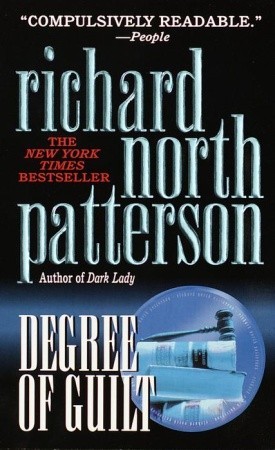Sunday, August 25, 2013
-
 crime
,
Legal
crime
,
Legal
 No comments
No comments
 crime
,
Legal
crime
,
Legal
 No comments
No comments
Degree of Guilt
Rating: 3.75
Stars
Version: Hardback
Author: Richard
North Patterson
GoodReads
Summary:
Mary Carelli, one of the most powerful women in TV journalism, is charged with the murder of Mark Ransom, America's most eminent novelist. Her attorney, Christopher Paget, sets out to shock the courtroom with revelations about Ransom as a twisted sexual predator. But as the trial unfolds, it is Paget who will be surprised...by Mary's secret motive for murder...by evidence that Mary is lying...by a woman prosecutor who believes Mary invented the story of rape...and by an enigmatic judge with an agenda of her own
A bit of
background
I would like to
include a bit of background about how I received this book before I launch into
the review. My hometown library held a book sale, but by the time I found out,
it was technically over. However, I decided to give them a visit and they
graciously allowed me to peruse their selection of books for sale. I ended up
purchasing this book along with a huge bag full for only TWO DOLLARS!! I was
hesitant at first because this is book 2 of the Christopher Paget series, but
it is a stand-alone novel.
Review:
I had to place
Degree of Guilt between a 3 and 4 star rating because it was more than “just
okay” but not as good as “really liked it”.
I seem to comment about this a lot, but the beginning was tremendously
slow. After forcing myself to read ~150 pages, I ended up putting the book back
on the shelf. Then a couple of weeks later I picked it back up and began where
I left off. The book eventually picked
up pace and I was able to start looking forward to reading it.
The story follows Christopher Paget,
a trial lawyer who has to represent his former ex-wife and son’s mother Mary
Carelli, charged with murder. Mary’s defense is that she was raped and shot her
attacker out of self-defense. The book had me a bit confused at the beginning,
because it opens at the scene of the incident without describing who is talking
or what happened to them. Christopher Paget is forced to represent Mary because
he wants to minimize the amount of damage his son is going to endure – his
mother is on trial for murder after all.
Paget’s dedication seemed a bit off to me, but the book takes you into
the past and makes it explicitly clear as to why his decision is what it is. I
don’t want to spoil the book, but I’ll just say that Mary and Paget’s
relationship is very complicated for several reasons:
- A famous case at the US Senate they won.
- A child born under strange – I can’t really find a word to suit what happened – circumstances.
- Career altering lies
- Their sons upbringing
Paget decides to
argue the case at a probable cause hearing, hoping to get it dismissed before
it makes it to trial. After hearing the case in full, I was a bit confused as to
why he decided not to let the case go to trial. The prosecutor could not have
met the burden of proof required for a beyond a reasonable doubt conviction.
However, I think it was because the evidence he had did not appear in full
until after the arraignment.
The evidence involves several other
women who Ransom – Mary’s attacker – raped and abused. Ransom was obsessed with
an actor who committed suicide and played out his fetishes with his victims. I
was a little shocked at the vivid detail of the rapes; in fact not much is
subdued in this book.
SPOILER – READ AT
YOUR OWN DESCRETION
There were a few
other surprises that shocked me. One was when Paget and Terri listened to
Mary’s “missing” tape. It revealed that Paget was not Carlo’s father! The
second occurred when Terri revealed that she was raped. It was not hard to
guess, because the impact this case was having on her was apparent.
End Spoiler
Many of the
characters I liked, such as: Terri, Sharpe, Paget, and Caroline. I respected
Mary, but I’m not sure that I had a favorable opinion of her by the end. She
was a very skilled and manipulative liar.
"For what Paget had learned from Carlo was that being a parent was not about ties of blood, any more than starting a family can assure love among its members. These bonds are ours to make, Paget knew; we define them, day by day, by who we choose to love and how we choose to love them. And, by these choices, define ourselves."

0 comments :
Post a Comment